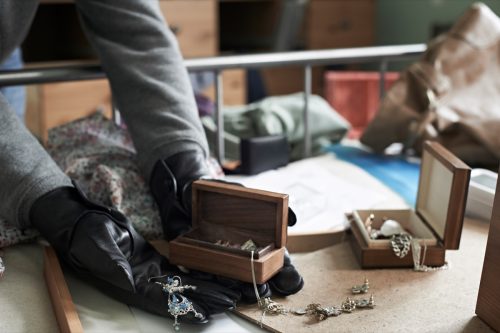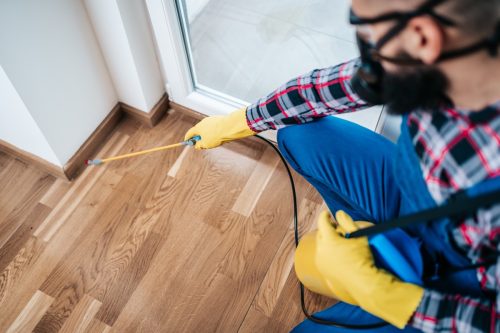Burglars Are Using This Trick to Get Inside Your Home, Police Say in New Warning

From expensive electronics to valuable antiques, there are a number of things in our homes that thieves would love to get their hands on. According to the Federal Bureau of Investigation (FBI), there are typically more than one million burglaries every year in the U.S., and in 2019, the total amount lost from victims of burglary offenses was estimated to be $3 billion. But while many of us think we do all we can to keep our homes safe—like installing high-end security equipment and making sure entrances are locked at all times—there are times when thieves can work their way into our homes without us even realizing it. Read on to find out what authorities are now warning is a trick burglars are using to get invited in.
READ THIS NEXT: Leaving This Outside Your Home Is Inviting Burglars In, Experts Warn.
There are plenty of dangers from thieves outside of burglary.

Keeping people across the U.S. safe is a hefty job, and police around the country don’t just concern themselves with helping you keep burglars out. After all, plenty of theft happens through less invasive scams.
Back in May, officials from Connecticut and North Carolina issued alerts about a spoofing trick that is convincing people they’re being called by the police when scammers are really on the other line, looking to access their funds.
And just this month, police in Indiana warned that an unordered package showing up on your doorstep could actually be part of a scam that could result in you becoming a victim of identity fraud, potentially leading to serious financial losses.
But burglary is an even scarier crime, and now police are warning about a scheme that puts your home and belongings in direct danger—and some people have already fallen for it.
Authorities have issued a new alert about home safety.

On July 27, the Bradenton Police Department in Bradenton, Florida, issued a press release regarding a recent burglary scheme. According to the alert, officials in Bradenton have charged one man from Pompano Beach for “his role in a pest control scam believed to span several Florida jurisdictions.”
Sean Frank, the 31-year-old charged, showed up to a victim’s home with another suspect claiming to be pest control employees. Instead, the two were burglars who stole cash, jewelry, and other items from the victim after they were let into the home. “Frank has been charged with burglary to an occupied dwelling and scheming to defraud,” Bradenton Police wrote.
RELATED: For more up-to-date information, sign up for our daily newsletter.
Officials say it’s not always easy to differentiate burglars from real pest control.

This wasn’t the first instance of this scheme, unfortunately. Bradenton Police said that detectives are continuing to investigate two similar burglaries that occurred in nearby neighborhoods. In May, a woman in Cape Coral, Florida, also had over $1,000 worth of jewelry stolen from her home by a man and a woman who knocked on her door posing as pest control workers, local NBC-affiliate WBBH reported.
The burglars told the woman that they had been recently hired by her homeowners association to take over pest control services. “It did look pretty legit. They also did have some type of spraying equipment,” Cape Coral Police Public Information Officer Brandon Sancho told the news outlet. “If you believe that they’re suspicious, most likely they are. This is something we are seeing across the State of Florida.”
Don’t let anyone in your home before verifying their identity.

While these crimes took place in Florida, the burglary scheme isn’t limited to one state. With that in mind, authorities have one key piece of advice to keeping yourself protected: “Do not allow anyone into your home that you didn’t hire,” Bradenton Police warned. According to the department, you should always confirm employment and identity of anyone unexpectedly showing up at your home before letting them in—whether they’re “claiming to be a contractor working on behalf of a homeowners’ association, management company, or another company.”
There are a number of ways you can try to confirm that strangers are actually working for a pest control company. Pestco says you should check their license—which you can do through the internet or your city’s regulatory agency—as well as verify their insurance. “Although specifics may vary from state to state, pest-control and pest management companies are usually required to buy liability insurance,” Pestco explains.